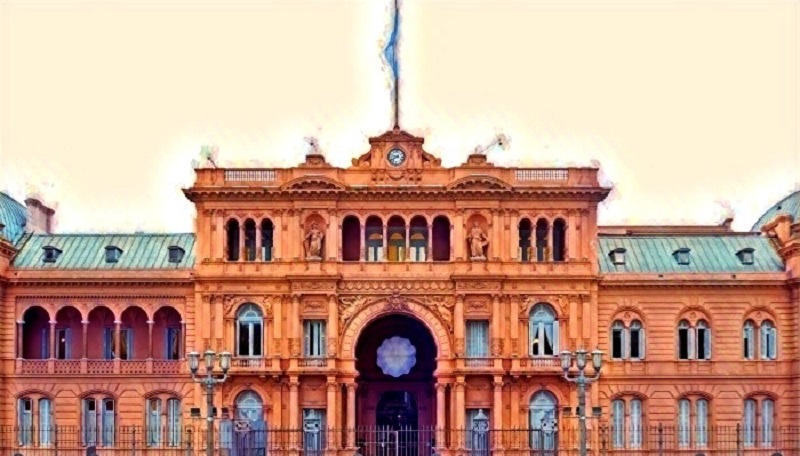
The man entered quickly, without stopping. He was wearing a dark overcoat that covered much of his face. It could be because of the cold, in these days of polar waves that hit Buenos Aires. Although he too, perhaps, he sought discretion. After all, with his name and his movements there is speculation every day, and more at this time. Not only because of the economic uncertainty that hits the country, which he is supposed to be in charge of. Also for his future. On that last point he was just coming to negotiate. Cristina Kirchner and Pedro’s “Wado” were waiting for him inside the Senate.
There were barely 24 hours left for the new inflation data reported by INDEC to be known, but the Minister of Economy Sergio Massa he was more concerned with another key date. Before midnight this Wednesday, he would have to register the alliances for the national elections in August, October and, most likely, November. About that he was going to talk, above all, with the vice president. Two of the three founding legs of the Frente de Todos would be reunited. The third, who lives in the Casa Rosada and the Quinta de Olivos, has been away for a while. He would probably be calling Daniel Scioli and Aníbal Fernández at the same time.
Finally, it was confirmed this Wednesday that that assembled family that is Peronism, which had been united during the first Menemism and under the government of Néstor, to later divorce during the mandates of Cristina and come together again in 2019 to form the Frente de Todos , will present itself “united” -if it can be called that- in this 2023, although under another name: Union for the Fatherland. Her first announcement In the electoral campaign, he repeated ritual formulas such as “growth with social inclusion” that are never fulfilled and, above all, he confirmed that the axis of the campaign is going to be to encourage the lesser evil against the right. Too trite after so much failure.
It remains to be seen in the next ten days the crucial data of which candidates are confirmed -there is time until the 24th- and if that unit will have the single list format from the beginning, or if there will be a dispute chapter in the STEP before all arrive with the same ticket to October, as seems most likely. Until this Wednesday the cross shots continued, with Daniel Osvaldo Scioli challenging the Cristina-Massa alliance and Victoria Tolosa Paz making the second: “Write the regulation that you write, we are going to introduce ourselves anyway.” Late in the afternoon, a very harsh statement of the Buenos Aires PJ (chaired by Máximo Kirchner) accepting the electoral regulations for apartments demanded by the Scioli sector, but accusing the former vice president and former governor of threatening to go to the “Judicial Party” which – according to them – outlawed Cristina Kirchner and of fighting harder for charges than for recovering the salaries. Behind the harshness of the words, a weakness is hidden anyway: Kirchnerism is betting everything to preserve the province of Buenos Aires and any rupture -Randazzo’s ghost- would put that objective even more at risk than it already is. The Peronist inmate of “unidad” began calmly.
In the majority sector of the family, the one that is reconciled, it also seems that nicknames are very important. Massa has long since stopped being a “traitor” to become “Sergio” in Kirchnerism. Pedro is not the one who takes photos with Clarín, Luis Barrionuevo and the Rural Society, but he is “Wado”. Some time ago, Durán Barba had orchestrated a campaign for “Macri” to become “Mauricio”. Today it is the Kirchner center-left that thinks that toads are more digestible like this. Postmodern illusions of current politics.
The name change of the alliance, of course, is not innocent. Faced with the growing political solitude of the law professor who occupies the presidency, who long ago abandoned his ridiculous postulate that he would run for re-election, the predominant faction of pan-Peronism that will compete this election year wants to get rid of a mandate that remains for the forgot. It is curious: those who were meeting in the Senate this Tuesday orchestrating the thread were the vice president, the Minister of Economy and the Minister of the Interior of the Frente de Todos. But, electorally, they will look the other way with the face of I was not, looking to break away from almost four years during which all the promises of 2019 were broken. The refrigerator was not filled but the coffers of banks and large companies were filled; The retirees did not win, but the usual powerful ones; there are no benefits for the majorities but for agropower (one “soybean dollar” after another), the automotive companies or the mining companies; Macri’s inheritance was not rejected, but the illegal agreement with the IMF was legitimized, whose adjustment recipes Sergio Massa applies today, with the support of Cristina Kirchner.
The separation -whether in different lists or discursive- with respect to Alberto Fernández and Martín Guzmán –today symbolized in Scioli-, it is functional to present in the elections an alternative that does not take charge of this legacy, despite the fact that they sustained it all this time with officials, legislators and bureaucrats from unions and social movements that guaranteed social peace while poverty rates They escalated to 40%. This management, in Peronism, was supported by Allbeyond the critics for the rostrum.
With such a balance -which already suffered harsh punishment at the polls in 2021, realizing that the main tension is not between leaders but with a large part of their social base due to the adjustment policies applied- the film of the Peronist defeat would be linear and sung, if it were not for the fact that those on the other side complement a perfect picture of the crisis of the political regime. Together for Changewhich appeared until recently as the almost inevitable winner of the election, is going through a deep crisis. Their parties are parties: the possible crossed formulas will realize that both the PRO and the UCR inhabit different political projectswhich these days are symbolized in the purism of a Patricia Bullrich supported by Macri and the “Malbec Group” of radicalism versus the amplitude of a Horacio Rodríguez Larreta who together with Gerardo Morales, the Civic Coalition, Pichetto and Espert issue a declaration and a announcement after another calling for a greater breadth of alliances in pursuit of better guarantees for the governability of the new adjustment plans to be applied after December 10. He Schiaretti case concentrated in all its dimension this dispute, which also has a purely electoral side: whoever wins in August will retain the votes of the losers of JvC in October?
Crouched waiting Javier Milei, dreaming of a defeat for Patricia Bullrich in the PASO that will bring her a new electoral flow in October among JxC supporters who do not want to accompany Larreta in the general elections. However, the libertarian leader is also haunted by ghosts: the media headlines went from talking about the “Miilei phenomenon” to consigning one failure after another of this political space in the provincial elections. The last of them was just this last Sunday, when Bussi’s facho sank at the polls in Tucumán. Of course, this Wednesday Guillermo Britos, who sounded very strong to be his candidate for governor in the province of Buenos Aires, declined the offer. None of these conclusions is mechanically transferable to the national arena, but they add another factor of uncertainty to the political scenario that houses the most uncertain elections of the last 20 years.
The confirmation of the current political alliances -simply with a name change in Peronism- express to a political regime that appears to be continuous when it is no longer viable under the same conditions as before: already out of step with the real political process, coalitions torn apart internally and in crisis with their own electoral bases, they continue forward despite everything. They are the expression of the old that does not stop dying. Something already seems certain: the next government will be born weak. A probable hypothesis is that the next president or president obtains around 25% of the votes in the PASO (although it may be even much less) and from then on build artificial numbers in October and the runoff. This lack of musculature anticipates new crises and convulsions of a future management that will try to continue adjustment plans and submission to the IMF in Argentina from the permanent crisis. In reality, Sergio Massa plans a new trip to the United States in the coming days and lights candles so that a bone is thrown at him to prevent a new jump in the crisis from occurring before December 10.
The media are, for the most part, part of the mismatch: His political coverage, dedicated 99% to reflecting and analyzing the internal ones of Peronism, of Together for Change and the evolution of Milei, are not only behind the scenes of real life but also of the political and class struggle processes seeping through the cracks of a political regime in crisis. In recent days, by dint of strikes, pickets, and mobilizations, the class struggle in Jujuy that challenges the totalitarian reform of Governor Gerardo Morales and puts on the table began to enter the national agenda, pushed against censorship. demands for better wages.
Two conclusions about the latter are important in this regard.: on the one hand, the right-wing of the electoral scene, encouraged and over-analyzed by the media, cannot make us lose sight of the fact that, against a background of crisis, resistance tendencies are emerging that may be anticipating new processes for -possibly- after December 10 , when a new government, of any sign, tries to apply new adjustment plans.
On the other hand, the importance of the left: with infinitely less coverage in the media -y operated down in almost all the surveys that are published- this space in Jujuy begins to display its potential and leaves lessons for tasks at the national level. After a historic election of almost 13% of the votes in May, that political capital is now put at the service of a great articulation for political challenge and class struggle. The constituents and referents of the PTS and the Left Front in the province, with Alejandro Vilca, Gastón Remy, Natalia Morales and Keila Zequeiros at the helm, have been playing a fundamental role in delegitimizing the totalitarian attempt of Gerardo Morales, and from there being a factor to coordinate and articulate the struggles from below against the reform and for wages. In other words: if it hadn’t been for the left, Morales’s reform would have encountered much less resistance. The current struggle, beyond its specific outcome, weakens a project of greater attacks against the workers and the people of Jujuy. Telephone also for Peronist governors who apply adjustment and repression, like Sáenz, Massa’s friend in Salta.
Jujuy’s teachings -provisional within the framework of a process that is still ongoing and has decisive battles these days- have to do with the need and Demonstrated utility of conquering political volume above and below, as an enormous preparatory task to have forces for the class struggle, terrain in which the decisive chapters of the crisis will be played. Neither Milei’s demagogy, nor the reform plans of Together for Change, nor the Peronism made up but submitted to the IMF, will be no solution. The task of the hour is to give strength to the struggles and to the PTS in the Left Front, which with Myriam Bregman, Nicolás del Caño and referents from all over the country, together with the Socialist Left, undertakes a new battle. The Jujuy scenario shows what we are preparing for.
Source: www.laizquierdadiario.com

